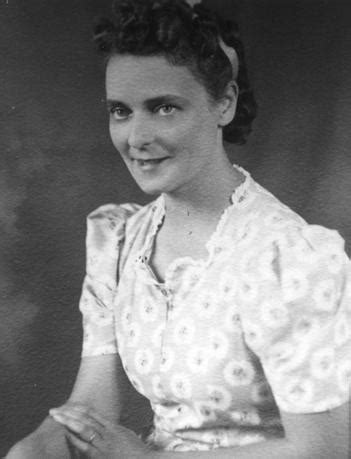A Quote by Milan Kundera
Tereza had gone back to sleep; he could not. He pictured her death. She was dead and having terrible nightmares; but because she was dead, he was unable to wake her from them. Yes, that is death: Tereza asleep, having terrible nightmares, and he unable to wake her.
Related Quotes
In Tereza’s eyes, books were the emblems of a secret brotherhood. For she had but a single weapon against the world of crudity surrounding her: the novels. She had read any number of them, from Fielding to Thomas Mann. They not only offered the possibility of an imaginary escape from a life she found unsatisfying; they also had a meaning for her as physical objects: she loved to walk down the street with a book under her arm. It had the same significance for her as an elegant cane from the dandy a century ago. It differentiated her from others.
And she arose from her deathbed in a gossamer gown, with eyes the color of starlight and hair as black as the night. And those who were her captors trembled, for the scent of death and madness emanated from her soul, and yet she was not dead. She moved like the spiders that creep in the treetops, and none could look away. Taking her first captor in hand, she fed deep and ravenous. And so it was that Myst, Queen of the Indigo Court, was born from the blood of the dead.
A queen is wise. She has earned her serenity, not having had it bestowed on her but having passer her tests. She has suffered and grown more beautiful because of it. She has proved she can hold her kingdom together. She has become its vision. She cares deeply about something bigger than herself. She rules with authentic power.
She was sound asleep when he came to curl up next to her. She grunted. "Don't worry. I'm too drunk, I won't do anything," he murmered. As she had her back to him, he placed his nose on her neck and slid his arm underneath her to be as close to her as possible. Short strands of her hair tickled his nostrils. "Camille?" Was she asleep? Was she pretending? No answer either way. "I like being with you." A little smile. Was she dreaming? Was she asleep? Who knows.
Tereza's mother never stopped reminding her that being a mother meant sacrificing everything. Her words had the ring of truth, backed as they were by the experience of a woman who had lost everything because of her child. Tereza would listen and believe that being a mother was the highest value in life and that being a mother was a great sacrifice. If a mother was Sacrifice personified, then a daughter was Guilt, with no possibility of redress.
Perhaps I will die too, she told herself, and the thought did not seem so terrible to her. If she flung herself from the window, she could put an end to her suffering, and in the years to come the singers would write songs of her grief. Her body would lie on the stones below, broken and innocent, shaming all those who had betrayed her. Sansa went so far as to cross the bedchamber and throw open the shutters ... but then her courage left her, and she ran back to her bed, sobbing.
She had come to him to escape her mother's world, a world where all bodies were equal. She had come to him to make her body unique, irreplaceble. But he, too had drawn an equal sign between her and the rest of them: he kissed them all alike, stroked them all alike, made no, absolutely no distiction between Tereza's body and the other bodies. He sent her back to the world she tried to escape, sent to march naked with the other naked women
Yet there were times when he did love her with all the kindness she demanded, and how was she to know what were those times? Alone she raged against his cheerfulness and put herself at the mercy of her own love and longed to be free of it because it made her less than he and dependent on him. But how could she be free of chains she had put upon herself? Her soul was all tempest. The dreams she had once had of her life were dead. She was in prison in the house. And yet who was her jailer except herself?
I was bullied by my siblings and cousins, so make-believe was a way in which I could be in charge. When I was like 10 and my sister was about five, I convinced her that she was going to jail because she used a bad word. The doorbell happened to ring, and I told her it was the police. I made her pack her bags. She was crying, and then I said to her, "I forgive you, and I'm gonna tell the cop to go away." Then, of course, she loved me. It was terrible - she still remembers it. I had a sordid sense of humor.
Not that she didn't enjoy the holidays: but she always felt-and it was, perhaps, the measure of her peculiar happiness-a little relieved when they were over. Her normal life pleased her so well that she was half afraid to step out of its frame in case one day she should find herself unable to get back.
Alex gazed at her. Her mouth was slightly open; she ran her fingernail against her lower teeth as she thought. She'd knotted her hair at the nape of her neck again, and a strand had slipped loose onto her shoulder, gleaming in the lantern light. Suddenly all of his objections seemed meaningless. Don't, he thought. You'll regret it. He didn't care anymore. Slowly, unable to stop himself, he reached out and cupped his hand around her foot.
The girl was lighter without her heart. She danced barefoot on the hot roads, and her feet were not cut by the glass or stones that studded her way. She spoke to the dead whenever they visited her. She tried to be kind, but they realised that they no longer had anything in common with her, and she realised it, too. So they went their separate ways.
Rebecca held her head high and swanned across the hallway, but as she neared the footman, she could see quite plainly that his gaze was not where it should be. She stopped dead and slapped her hands over her bosom. "Its too low, isn't it? I knew I shouldn't have listened to that maid. She might not mind her boobies hanging out for all to see, but i just can't-" Her brain suddenly caught up with her mouth. She removed her hands from her bosom and slapped them over her awful, awful, awful mouth.



































